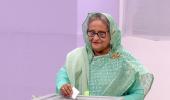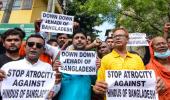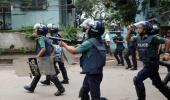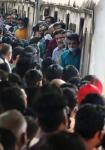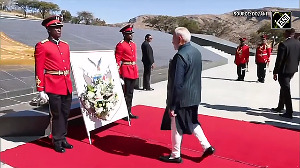'Are we supposed to look the other way as Islamists go on a rampage against Hindus and the Hasina government pay lip service to secularism?'
A revealing excerpt from Avishek Biswas and Deep Halder's book, Being Hindu In Bangladesh: The Untold Story.
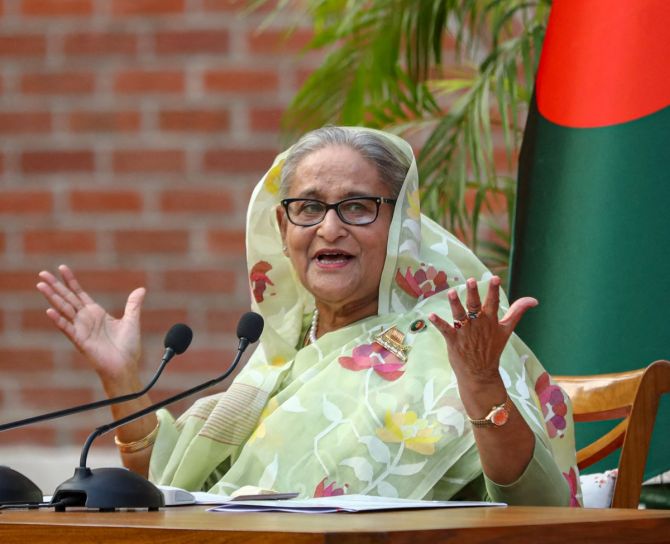
Back in Kolkata after our Delhi and Dhaka visit, we meet Asad Noor -- exiled Bangladeshi blogger and human rights activist -- at Melbourne Cafe in Jodhpur Park in the southern part of Kolkata, where he currently stays and from where he vlogs and does Facebook lives almost every night to report on the country he has escaped from.
'From outside it may appear that the Sheikh Hasina government is secular and democratic, and the BNP and the Jamaat combine is the root of all evil, but there are fissures within fissures. Bangladesh's politics, like the politics of its South Asian neighbours, is more complicated than a simple secular-communal binary,' he tells us."
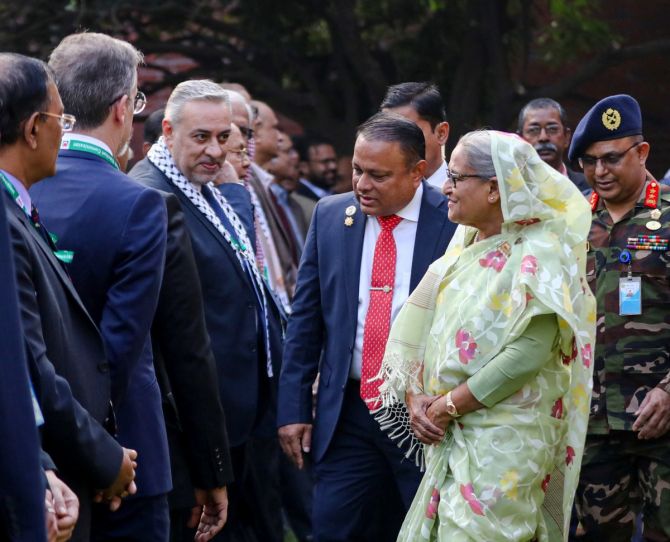
Noor is an advocate for freedom of expression and, LGBTQIA rights, and has criticised religious fundamentalism in Bangladesh and paid a rather hefty price for it.
He has been prosecuted multiple times by Bangladeshi authorities for alleged blasphemy and hurting religious sentiments, been sent to prison, and has been in exile in India since 2019.
'I try to show what mainstream news media in Bangladesh cannot,' says No or. 'I ask questions most of our journalists back home do not, for fear of life and limb. You think religious fundamentalists are only with the Bangladesh Nationalist Party and the Jamaat?
Much of the rank and file of the Awami League today is filled with people who may not speak hate, but secretly endorse it.
Not just the Awami League, Bangladesh society as a whole has been infected by fundamentalism.
'You wonder how Bangladesh became like this? Well, Sheikh Hasina is the longest serving prime minister in the history of Bangladesh, having served for a combined total of over nineteen years. On 10 January 2023, she will become the world's longest-serving female head of government in history.
'During her rule, there have been marvellous bridges and splendid buildings, the GDP has gone up, but economic disparity prevails and so does corruption. People are unhappy, and much of the country is poor and illiterate.
'They have lost hope from this life and hence look forward to an afterlife. And that is where peddlers of religion come in with promise of jannat and to preach hate for those who do not follow their faith.;
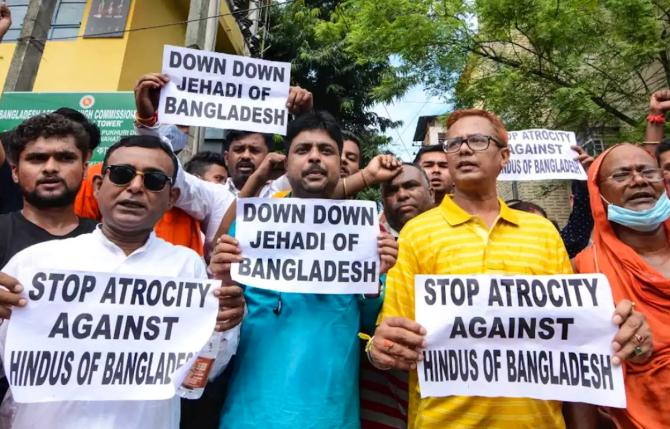
'It starts from the madrasas. I went to one myself as a child growing up in rural Bangladesh and know what is taught there makes you look at people from other faiths with derision, if not direct hate.
The huzurs, most of whom are very popular in Bangladesh's hinterland, routinely preach religious extremism, the waj-mehfils are most often hate gatherings and ever since Zakir Naik entered the scene, people got to know that you can dress modern and remain backward,' Noor says.
If not the Awami League, who will the Hindus in Bangladesh repose faith in, we ask.
'It is true Awami League did not trade in religion,' he replies. 'But after the grenade attack on her in 2004, Sheikh Hasina realised she had to reach out to fundamentalists. Understand her politics.
'Hasina is perceived in Bangladesh to be close to India and India is a Hindu-majority country. To balance this, in Bangladesh she has to give a degree of free hand to Islamic hardliners.'
This is the view of one human rights activist in exile, a person who may be bitter at the government of the day for the downward spiral his life has taken.
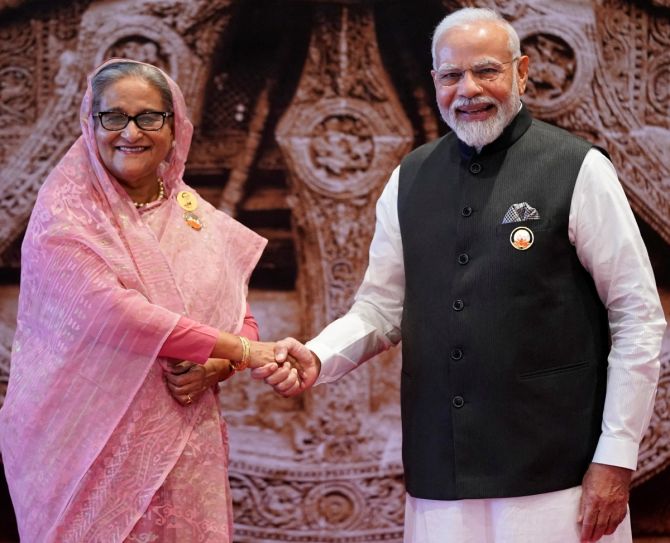
So we listen to a podcast that Asad Noor did with writer-activist Taslima Nasrin on the unstoppable rise of the religious hard right in Bangladesh. For her books, Nasrin is persona non grata in her homeland Bangladesh. In the podcast she says:
'Twenty-eight years ago, then prime minister and Sheikh Hasina's arch rival Khaleda Zia banned my book Lajja. Lajja was a fictitious tale on the lived reality of Hindus in Bangladesh. Now Sheikh Hasina has been in power, in this stint, since 2009. And Khaleda Zia is in jail. Why has Hasina not revoked the ban?
'Why has she not brought back the secular constitution she promised she would? Why has she not checked the growth of waj-mehfils and the spurting of madrasas that brainwash the youth of the country to become anti-women, anti-minority and anti-progress and only be blinded by hate for worshippers of "false gods"?'
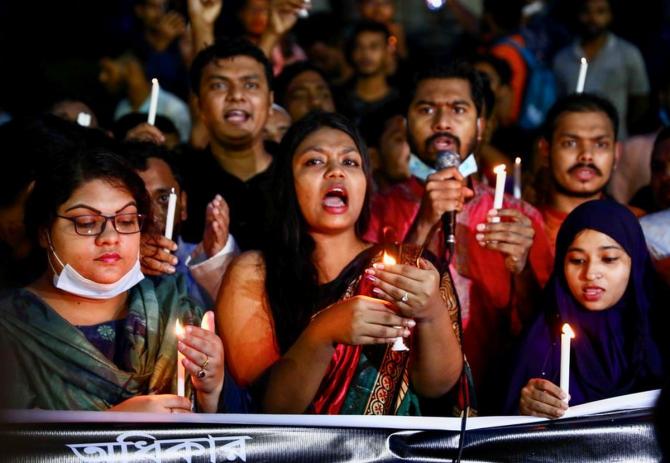
The controversial writer does not spare the public intellectuals: 'Most of them have sent their kids abroad to study there and settle down. Who will the country belong to tomorrow? Jihadists? What will become of Bangladesh?', she asks.
As answer to her question, Asad Noor puts 'out a list of what has become of Bangladesh today.
In September 2012, for instance, in the Cox Bazar area of Chittagong district, one Uttam Kumar Barua, a Buddhist, was alleged to have hurt religious sentiments of the majority Muslims.
Buddhist houses, shops, temples were looted, set on fire. Years passed, new houses were built on the ruins of the old, new temples came up where old temples once stood. But no action was taken against men who went on a rampage. There is no trace of Uttam Kumar Barua till today.

Asad then talks about the October of 2016, when one Roshash Das, from the Nasirnagar upazila of Chittagong district, was arrested and tortured for a religious hate spewing Facebook post.
It was local Awami League leaders who created a ruckus over the post.
After the interrogation and torture of Das, it came to be known that the poor guy didn't even have an account on Facebook!
In 2017, the same fate awaited Titu Ray, from Rangpur, who was arrested and tortured in jail, before it was discovered he had not posted on social media what he was being accused for!
The list is long.
'I am not surprised,' says Asad Noor. 'Isn't this routine in Bangladesh now? Yes, Sheikh Hasina is better than the others. But is that good enough? Are we supposed to look the other way as Islamists go on a rampage against Hindus and the Hasina government pay lip service to secularism? How did we get here?'
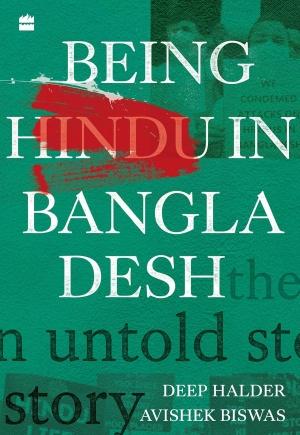
How did Bangladesh get here?
Let us go back to how Bangladesh began.
When East Pakistan became Bangladesh, unlike Pakistan, which was built around religion, the new country was created along linguistic lines, Bengali over Urdu, and a syncretic identity over a religious one.
Bangabandhu Sheikh Mujibur Rahman had famously said: 'This land is not the land of Muslims. This land is not the land of Hindus. This is everybody's land.'
Excerpted from Being Hindu In Bangladesh: The Untold Story, by Avishek Biswas and Deep Halder, with the kind permission of the publishers, HarperCollins India.
Feature Presentation: Rajesh Alva/Rediff.com
